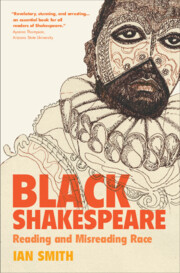Chapter 2 - Racial Blind Spots
Misreading Bodies, Misreading Texts
Published online by Cambridge University Press: 08 September 2022
Summary
Beginning in 1740, the passage of a series of antiliteracy laws formally racialized reading in America. The expansion of those antiliteracy laws authorized whites to determine by sight, and not slave status, who was to be designated black and mandated to illiteracy, therefore, bringing sight and reading into peculiar proximity as a predicate for reading bodies and reading texts. A prehistory of these intersections exists in Othello’s interrogation of sight’s reliability in determining racial knowledge at a moment when a broader cultural and philosophical debate about the stability of sight’s relation to knowledge was underway. This chapter argues that Othello presents a unique anatomy of an actual reading process during which an audience’s seemingly secure knowledge of racialized blackness is subverted. Shakespeare “interpellates” or calls out the audience’s white reading identity to posit its unreliability. Recent developments in “blind spot” theory and empirical research relative to automatic white preference prolong this history of unreliable sight, providing further explanatory tools for representing the phenomenon of unreliable racial reading of bodies and texts.
- Type
- Chapter
- Information
- Black ShakespeareReading and Misreading Race, pp. 53 - 78Publisher: Cambridge University PressPrint publication year: 2022

